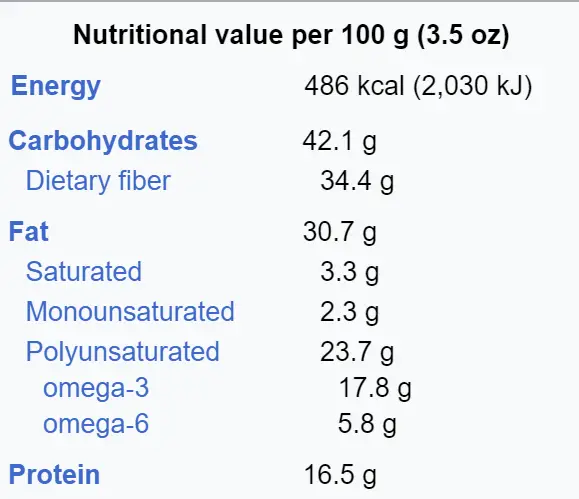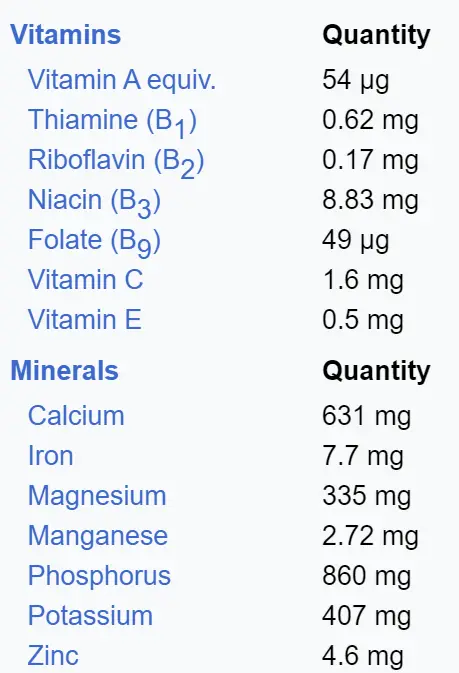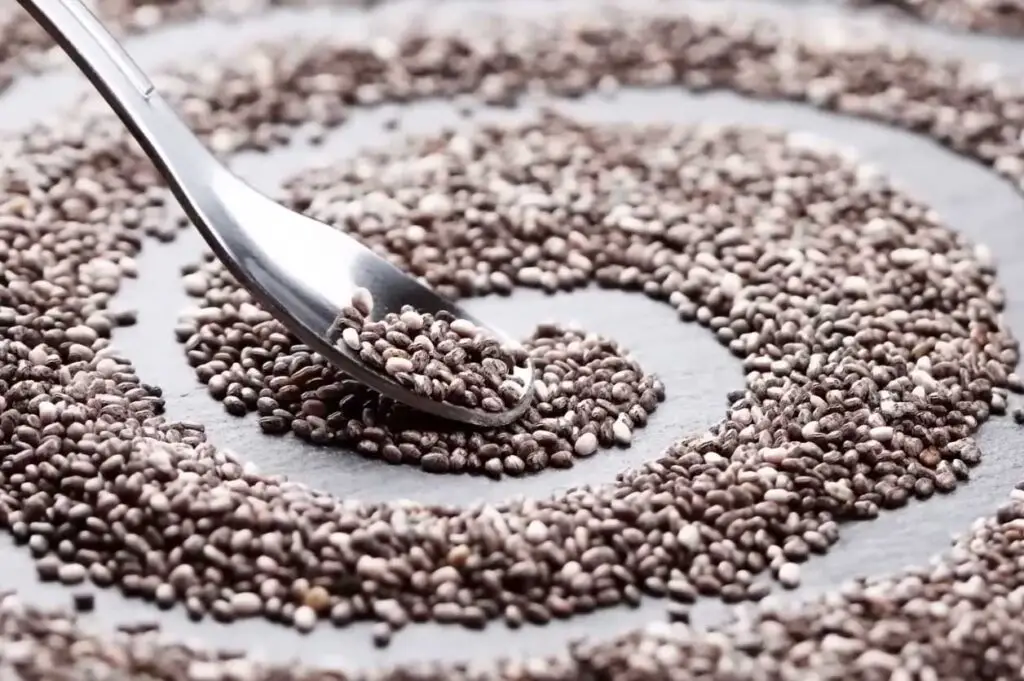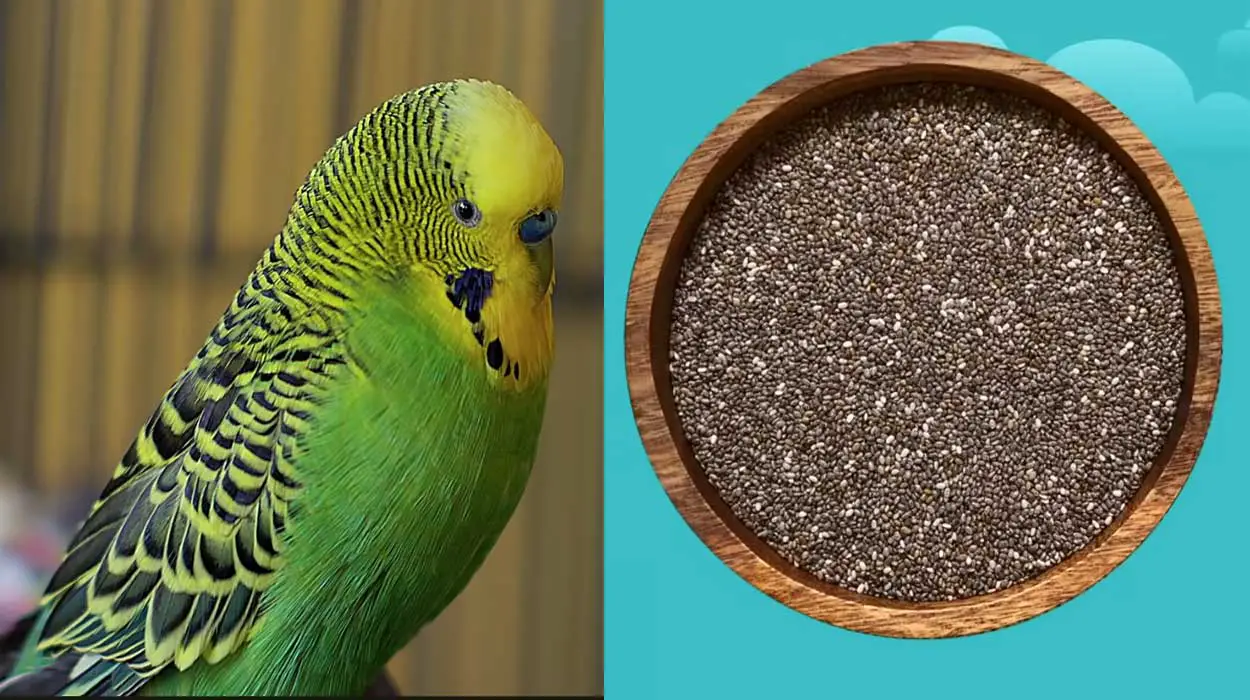Can Parakeets Eat Chia Seeds?
Chia seeds, hailed as a recent super food, are gaining popularity among health-conscious individuals. Parakeet owners, ever keen on enhancing their pet’s nutrition, find themselves wondering: Can parakeets eat chia seeds? Yes, parakeets can eat chia seeds. They are safe.
Nutritional Value of Chia Seeds
Achieving a harmonious balance in the avian world is paramount, and judicious incorporation of chia seeds into a parakeet’s diet can unlock a treasure trove of nutritional benefits.

These minuscule seeds emerge as a nutritional powerhouse, delivering essential omega-3 fatty acids vital for feather health, fiber to facilitate smooth digestion, and protein fostering robust muscle development.
Beyond enhancing plumage vibrancy, omega-3s fortify immune function and cognitive well-being. Omega-3 fatty acids demonstrate positive impacts on cardiovascular health by reducing cholesterol, regulating heart rhythms, controlling blood pressure, preventing blood clots, and reducing inflammation.
Fiber acts as a digestive ally. Chia seeds contain soluble fiber and mucilage, giving them a gluey texture when moistened. These fibers may reduce LDL cholesterol, slow digestion, prevent blood sugar spikes, and promote fullness.
Protein supports muscle growth and repair, nurturing overall vitality. Chia seeds, the richest plant source of omega-3 fatty acids, also boast a complete protein profile with all nine essential amino acids.

Safety of Chia Seeds for Parakeets
To harness these benefits, explore diverse methods of serving chia seeds to parakeets, such as soaking, mixing, or sprouting. This not only ensures nutritional value but also provides culinary enrichment for our avian friends.
However, the promising prospect of integrating chia seeds into a parakeet’s diet comes with cautions that merit careful consideration. Chia seeds possess a unique characteristic—they can absorb substantial water and expand, potentially causing discomfort or blockages in the parakeet’s crop.
This physiological aspect underscores the importance of moderation and proper preparation when introducing chia seeds. The high fat and caloric content, while beneficial in moderation, pose a risk of obesity or liver complications if not balanced with other dietary components.
Chia seeds also contain anti-nutrients like phytic acid and oxalates, which, if not managed, may interfere with mineral absorption, impacting overall health.
Navigating these risks necessitates a nuanced approach, involving measured portions, adequate hydration, and perhaps consultation with a veterinarian to tailor chia seed consumption to the specific needs of individual parakeets.
How to Introduce Chia Seeds to Your Parakeet
Embarking on the introduction of chia seeds to your parakeet’s diet requires a gradual and attentive approach to ensure a seamless transition.
Start small, incorporating chia seeds into their meals over several days. Observe their response closely, noting any signs of discomfort or aversion. The gradual introduction allows your feathered companion to acclimate to this new addition without causing stress or disrupting their routine.
As you monitor their reaction, pay particular attention to any adverse effects such as diarrhea, vomiting, or unusual behavior. These signals can serve as valuable indicators of your parakeet’s tolerance and acceptance of chia seeds. Should any concerning symptoms arise, it’s advisable to halt the introduction and consult with a veterinarian.

Enhance the appeal of chia seeds by mixing them with other favorite foods. This not only makes the introduction more enticing but also adds variety to their diet. Experiment with combinations to discover a blend that captures your parakeet’s taste buds and encourages a positive response.
Related post-Is Sunflower Seed Good for Parrots?
Consider your parakeet’s individual preferences throughout this process. Birds, like humans, have unique tastes, and some may be more receptive to the introduction of chia seeds than others. Tailoring the approach to your parakeet’s likes and dislikes ensures a smoother transition and a higher likelihood of successful incorporation into their regular diet.
Remember, patience is key. Introducing new elements to your parakeet’s diet is a gradual journey, and the pace should align with your bird’s comfort. By following these steps and staying attuned to your parakeet’s cues, you can make the introduction of chia seeds a positive and enriching experience for both you and your feathered friend.
Additional Tips for a Healthy Parakeet Diet
Maintaining a robust and well-balanced diet is pivotal for the overall health and vitality of your cherished parakeet. Consider the following tips to ensure your feathered companion enjoys a nutritious and varied diet:
- Embrace Dietary Diversity: Encourage a well-rounded diet by incorporating a mix of high-quality pellets, fresh fruits, and vegetables. This diversity provides essential nutrients, adds a delightful array of flavors and textures to your parakeet’s meals.
- Occasional Treats in Moderation: While treats can be a delightful addition, moderation is key. Limit the intake of high-calorie or sugary treats to prevent weight issues and maintain a balanced nutritional profile.
- Fresh Water Always: Ensure your parakeet has constant access to clean and fresh water. Hydration is vital for their well-being, supporting proper digestion and overall health.
- Regular Monitoring of Body Condition: Keep an eye on your parakeet’s body condition. Adjust their diet as needed to prevent undernourishment or excess weight gain. A healthy weight contributes to optimal well-being.
- Rotate Food Choices: Rotate the types of fruits and vegetables you offer regularly. This not only introduces variety but also ensures your parakeet receives a broad spectrum of nutrients from different food sources.
- Avoid Feeding Toxic Foods: Familiarize yourself with foods that are toxic to parakeets, such as chocolate, avocado, and certain seeds. Strictly avoid these to safeguard your bird’s health.
- Regular Vet Check-ups: Schedule regular check-ups with an avian veterinarian to monitor your parakeet’s health. A professional can provide personalized advice based on your bird’s specific needs. It will ensure early detection of any potential health issues.
Remember, a thoughtful and diverse diet, coupled with attentive care, contributes to the longevity and well-being of your feathered friend. By incorporating these tips into your parakeet’s routine, you’ll be fostering a healthy and happy companion for years to come.
Conclusion
In closing, the question of whether parakeets can enjoy chia seeds is met with an affirmative nod. But with a gentle reminder of the need for prudence and thoughtful introduction. Chia seeds, with their array of nutritional benefits, can indeed enhance your parakeet’s diet when approached with care.
Recapitulating the key points, we’ve explored the safety aspects, nutritional perks, and methods of introducing chia seeds to your feathered companion. The journey of incorporating these tiny wonders into your parakeet’s meals is an exploration of balance and adaptation.
As you venture into this dietary enrichment, remember the importance of moderation. Gradual introduction, and close observation of your parakeet’s response. Chia seeds alongside a diverse array of foods, you not only provide essential nutrients but also enrich their culinary experience.
In the broader context of a healthy parakeet diet, diversity remains a cornerstone. Whether it’s pellets, fresh produce, or the occasional treat, the key lies in balance and variety. Keep a watchful eye on your parakeet’s well-being, ensuring a healthy body condition, and consult with a veterinarian for personalized advice.
As a parakeet owner, your commitment to a thoughtful and caring approach to their diet is a testament to the bond you share. With these considerations in mind, you’re well-equipped to navigate the exciting terrain of providing a nourishing and enjoyable culinary experience for your vibrant feathered friend. Here’s to the well-being and happiness of your cherished parakeet companion!
References:
- Suri, S., Passi, J. S., Goyat, J. Chia Seed (Salvia Hispanica L.) – A New Age Functional Food. 4th International Conference on Recent Innovations in Science Engineering and Management. March 20, 2016.
- de Souza Ferreira C, de Sousa Fomes LD, Espirito Santo da Silva G, Rosa G. Effect of chia seed (Salvia hispanica L.) consumption on cardiovascular risk factors in humans: a systematic review. Nutricion hospitalaria. 2015;32(5).
- Chia Seeds | The Nutrition Source. Harvard School of Public Health.
- Seeds, chia seeds, dried. U.S. DEPARTMENT OF AGRICULTURE
